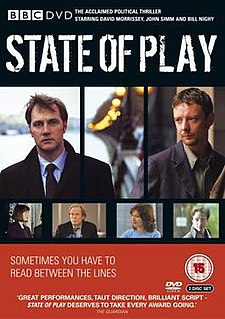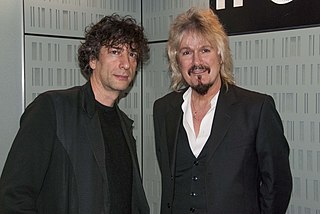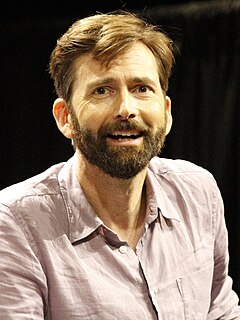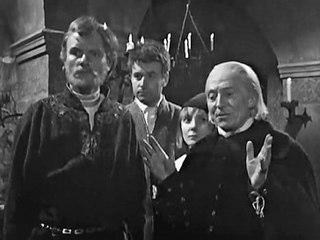
Radio drama is a dramatized, purely acoustic performance. With no visual component, radio drama depends on dialogue, music and sound effects to help the listener imagine the characters and story: "It is auditory in the physical dimension but equally powerful as a visual force in the psychological dimension." Radio drama includes plays specifically written for radio, docudrama, dramatized works of fiction, as well as plays originally written for the theatre, including musical theatre, and opera.
City of Death is the second serial of the seventeenth season of the British science fiction television series Doctor Who, which depicts the adventures of a time-travelling humanoid alien known as the Doctor. It was produced by the BBC and first broadcast in four weekly parts between 29 September 1979 and 20 October 1979 on BBC1. The serial was written by "David Agnew" – a pseudonym for David Fisher, Douglas Adams, and Graham Williams – and directed by Michael Hayes.

Our Friends in the North is a British television drama serial produced by the BBC. It was originally broadcast in nine episodes on BBC2 in early 1996. Written by Peter Flannery, it tells the story of four friends from Newcastle upon Tyne over a period of 31 years, from 1964 to 1995. The story makes reference to certain political and social events which occurred during the era portrayed, some specific to Newcastle and others which affected Britain as a whole. These include general elections, police and local government corruption, the UK miners' strike (1984–85), and the Great Storm of 1987.

State of Play is a British television drama series, written by Paul Abbott and directed by David Yates, that was first broadcast on BBC One in 2003. The series tells the story of a newspaper's investigation into the death of a political researcher, and centres on the relationship between the leading journalist, Cal McCaffrey, and his old friend, Stephen Collins, who is a Member of Parliament and the murdered woman's employer. The series is primarily set in London and was produced in-house by the BBC in association with the independent production company Endor Productions. The series stars David Morrissey, John Simm, Kelly Macdonald, Polly Walker, Bill Nighy, and James McAvoy in the main roles.

Thomas Nigel Kneale was a British screenwriter who wrote professionally for more than 50 years, was a winner of the Somerset Maugham Award, and was twice nominated for the BAFTA Award for Best British Screenplay.

Martin Campbell is a New Zealand film and television director based in the United Kingdom. He directed the British miniseries Edge of Darkness (1985), for which he won a BAFTA, The Mask of Zorro (1998), and the James Bond films GoldenEye (1995) and Casino Royale (2006).
Inferno is the fourth and final serial of the seventh season of the British science fiction television series Doctor Who, which was first broadcast in seven weekly parts on BBC1 from 9 May to 20 June 1970. The serial remains the last time a Doctor Who story was transmitted in seven episodes. This serial was also the last regular appearance of Caroline John in the role of Liz Shaw.
Doctor Who spin-offs refers to material created outside of, but related to, the long-running British science fiction television series Doctor Who.

The Quatermass Experiment is a British science fiction serial broadcast by BBC Television during the summer of 1953 and re-staged by BBC Four in 2005. Set in the near future against the background of a British space programme, it tells the story of the first crewed flight into space, supervised by Professor Bernard Quatermass of the British Experimental Rocket Group.
Piers Inigo Haggard, OBE, is a British theatre, film and television director, although he has worked mostly in the latter.

David George Dirk Maggs is a British freelance writer and director. During his career as a Senior Producer in BBC Radio he made radio drama adopting a cinematic-sounding approach, combining filmic story construction, layered sound effects, orchestral music and digital recording technology. Maggs introduced productions in Dolby Surround in BBC Radio and termed the result, "Audio Movies".

David John Tennant is a Scottish actor.

The Crusade is the sixth serial of the second season in the British science fiction television series Doctor Who. Written by David Whitaker and directed by Douglas Camfield, the serial was broadcast on BBC1 in four weekly parts from 27 March to 17 April 1965. In this serial, the First Doctor and his travelling companions Ian Chesterton, Barbara Wright, and Vicki arrive in 12th century Palestine during the Third Crusade, and find themselves entangled in the conflict between King Richard the Lionheart and Saladin. They also meet King Richard's sister Lady Joanna and Saladin's brother Saphadin.

Matthew Robinson is a British-Cambodian television and film executive producer, producer, director and writer. After graduating from Cambridge University. he directed many hundreds of episodes of popular British television dramas and soap operas in the 1970s and 1980s. He became the first producer of the series Byker Grove (1989–1997), and was also made the executive producer of EastEnders (1998–2000).

Nicholas Briggs is an English actor, writer, director, sound designer and composer. He is associated with the BBC science fiction television series Doctor Who and its spin-offs, particularly as the voice of the Daleks and the Cybermen in the 21st century series.
Graeme Harper is a British television director. He is best known for his work on the science-fiction series Doctor Who, for which he is the only person to have directed episodes of both the original run (1963–89) and revived run (2005–) of the programme. Doctor Who Magazine has described him as "the longest-serving crew member on Doctor Who."
A number of officially licensed audio productions based upon the long-running British science fiction television series Doctor Who have been produced over the years.
Douglas Hodge is an English actor, director, and musician who trained for the stage at the Royal Academy of Dramatic Art. Hodge is a council member of the National Youth Theatre for which, in 1989, he co-wrote Pacha Mama's Blessing about the Amazon rain forests staged at the Almeida Theatre.

Thomas George Hooper is a British-Australian film and television director and producer.
Derek Wax is a British television producer. His work includes Sex Traffic, Occupation, The Hour,Troy: Fall of a City,Capital and Humans. He was a producer at Granada TV from 2001-2005 and an Executive Producer at Kudos from 2005-2017.











